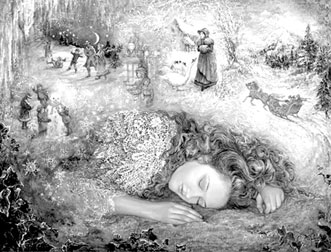Of dreams and dreamers
.jpg) Dreams are such common experiences that there is scarcely anybody who
has not had dreams. From time immemorial, philosophers and psychologists
have been trying to define dreams and come to grips with their real
characteristics. According to psychologists, dreams are a type of
psychological activity or experience which occur during sleep. Dreams are such common experiences that there is scarcely anybody who
has not had dreams. From time immemorial, philosophers and psychologists
have been trying to define dreams and come to grips with their real
characteristics. According to psychologists, dreams are a type of
psychological activity or experience which occur during sleep.
Dreams have two basic characteristics. In the first place, when we
dream we are oblivious to other people and things around us. Secondly,
when the dream is over, we remember very little of our dreams. Some of
the dreams we see are so pleasant that we wish to experience them once
more. However, we may not see the same dream again.
Leading psychologist Sigmund Freud spent nearly four decades trying
to understand the process of dreaming and interpreting the dreams. As
dreams represent a very puzzling but common experience more research has
to be done to understand them. Modern psychologists are not in total
agreement with the Freudian interpretation of dreams. This shows the
difficulty of understanding the process of dreaming and interpretation.
As we dream during sleep, we are not conscious of ourselves and our
surroundings. However, while dreaming we get the impression that we are
conscious of our surroundings. This paradoxical condition led early
philosophers and psychologists to believe that dreams represent a
special form of consciousness and thought.
Indian thought
According to traditional Indian thought, the dream is a separate form
of consciousness. It was known as 'Swapna'. This is closely connected
with sleep (Shushupti), Prajna or awareness and Jagrat or alertness.
Indian philosophers and psychologists have made a number of attempts to
explain the phenomenon of dreaming in subsequent years.
 While dreaming is an unconscious activity, daydreaming seems to be a
conscious process. The latter occurs when our senses are fully alert
though diverted from reality. Daydreams very often reflect our conscious
desires and plans to achieve certain goals. For instance, a person who
is anxious to become a rich businessman will always daydream of his
success. On the other hand, dreams belong to a different category as
they do not stem directly from conscious desires or aspirations. While dreaming is an unconscious activity, daydreaming seems to be a
conscious process. The latter occurs when our senses are fully alert
though diverted from reality. Daydreams very often reflect our conscious
desires and plans to achieve certain goals. For instance, a person who
is anxious to become a rich businessman will always daydream of his
success. On the other hand, dreams belong to a different category as
they do not stem directly from conscious desires or aspirations.
Psychologists say that daydreams are a form of fantasy in which we
indulge in most willingly. However, daydreams are different from
fantasy. While daydreams are well organised and relate to the
consciousness of the individual, fantasy does not fit into that
definition. When you daydream, you become the central character of the
experience. All the other events and experiences are subservient to you.
Most of us daydream about our future. Our focus may be success or
failure in life.and its myriad activities.
Daydreams
Today people pay more attention to daydreams than dreams. This is
because daydreams are influenced by our wishes, fears and worries.
These elements play a major role when we are free from the
constraints of reality. In fact, daydreams act as temporary egocentric
holidays from reality. Adults have a greater capacity for daydreaming
because of their ego. However, young children do not experience
daydreams because their ego remains relatively undeveloped.
Sometimes, we laugh at daydreamers. Daydreaming is supposed to be
unproductive and a waste of time. However, modern psychological research
shows that daydreams are not always useless. In fact, they are useful in
more ways than one. Daydreams provide us with a refreshing and
reassuring escape from reality. When we are oppressed by reality,
daydreams can instil hope and courage in us. This does not mean that we
should replace reality with daydreams.
Setting goals
Those who daydream have the habit of setting goals for their
aspirations. As human beings we all have ambitions. Daydreaming helps us
to realise our ambitions to a certain extent.
History is full of successful daydreamers. Dick Whittington was a
poor boy who daydreamed to be the Mayor of London. In fact, he became
the Mayor on three occasions. Although Demosthenes was a stammerer, he
was daydreaming to be the greatest orator in the world.
Ultimately, he became what he wanted to be.
Woodrow Wilson said, "We grow great by dreams. All big men are
dreamers. They see things in the soft haze of a spring day or in the red
fire of a long winter's evening. Some of us let these great dreams die
but others nourish and protect them; nurse them through bad days till
they bring them to the sunshine and light which come always to those who
sincerely hope that their dreams will come true."
Obviously, Woodrow Wilson is not referring to dreams we experience
during sleep. His dreams are loaded with philosophical meaning.
|

